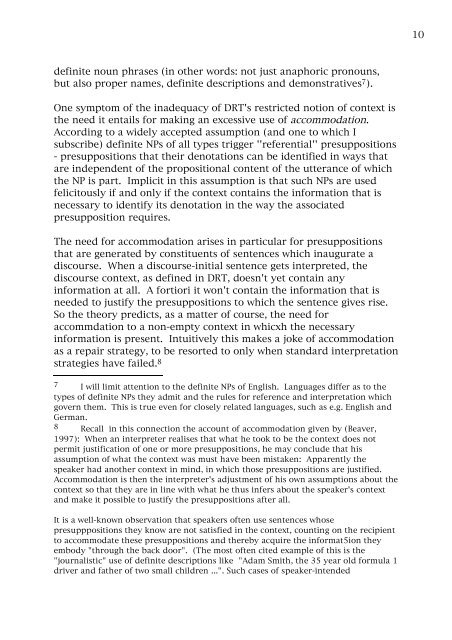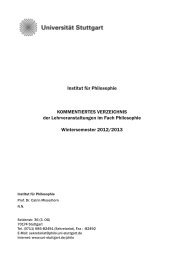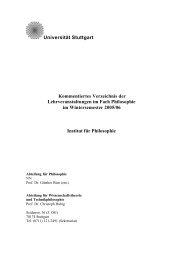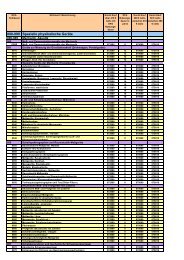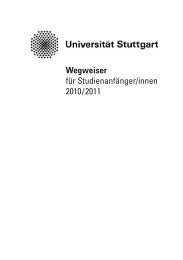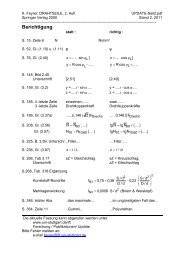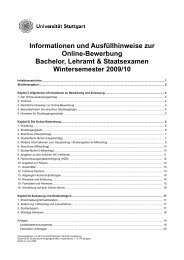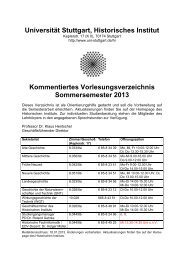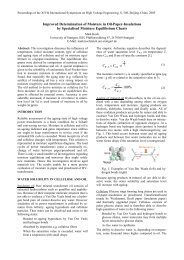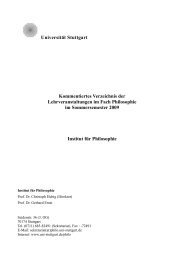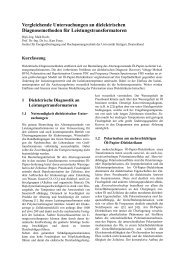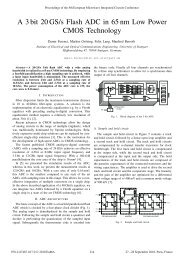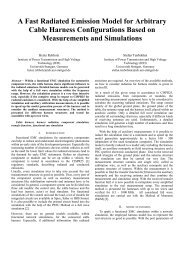Discourse Structure and the Structure of Context - Multiple Choices
Discourse Structure and the Structure of Context - Multiple Choices
Discourse Structure and the Structure of Context - Multiple Choices
Create successful ePaper yourself
Turn your PDF publications into a flip-book with our unique Google optimized e-Paper software.
10<br />
definite noun phrases (in o<strong>the</strong>r words: not just anaphoric pronouns,<br />
but also proper names, definite descriptions <strong>and</strong> demonstratives 7 ).<br />
One symptom <strong>of</strong> <strong>the</strong> inadequacy <strong>of</strong> DRT's restricted notion <strong>of</strong> context is<br />
<strong>the</strong> need it entails for making an excessive use <strong>of</strong> accommodation.<br />
According to a widely accepted assumption (<strong>and</strong> one to which I<br />
subscribe) definite NPs <strong>of</strong> all types trigger ''referential'' presuppositions<br />
- presuppositions that <strong>the</strong>ir denotations can be identified in ways that<br />
are independent <strong>of</strong> <strong>the</strong> propositional content <strong>of</strong> <strong>the</strong> utterance <strong>of</strong> which<br />
<strong>the</strong> NP is part. Implicit in this assumption is that such NPs are used<br />
felicitously if <strong>and</strong> only if <strong>the</strong> context contains <strong>the</strong> information that is<br />
necessary to identify its denotation in <strong>the</strong> way <strong>the</strong> associated<br />
presupposition requires.<br />
The need for accommodation arises in particular for presuppositions<br />
that are generated by constituents <strong>of</strong> sentences which inaugurate a<br />
discourse. When a discourse-initial sentence gets interpreted, <strong>the</strong><br />
discourse context, as defined in DRT, doesn't yet contain any<br />
information at all. A fortiori it won't contain <strong>the</strong> information that is<br />
needed to justify <strong>the</strong> presuppositions to which <strong>the</strong> sentence gives rise.<br />
So <strong>the</strong> <strong>the</strong>ory predicts, as a matter <strong>of</strong> course, <strong>the</strong> need for<br />
accommdation to a non-empty context in whicxh <strong>the</strong> necessary<br />
information is present. Intuitively this makes a joke <strong>of</strong> accommodation<br />
as a repair strategy, to be resorted to only when st<strong>and</strong>ard interpretation<br />
strategies have failed. 8<br />
7 I will limit attention to <strong>the</strong> definite NPs <strong>of</strong> English. Languages differ as to <strong>the</strong><br />
types <strong>of</strong> definite NPs <strong>the</strong>y admit <strong>and</strong> <strong>the</strong> rules for reference <strong>and</strong> interpretation which<br />
govern <strong>the</strong>m. This is true even for closely related languages, such as e.g. English <strong>and</strong><br />
German.<br />
8 Recall in this connection <strong>the</strong> account <strong>of</strong> accommodation given by (Beaver,<br />
1997): When an interpreter realises that what he took to be <strong>the</strong> context does not<br />
permit justification <strong>of</strong> one or more presuppositions, he may conclude that his<br />
assumption <strong>of</strong> what <strong>the</strong> context was must have been mistaken: Apparently <strong>the</strong><br />
speaker had ano<strong>the</strong>r context in mind, in which those presuppositions are justified.<br />
Accommodation is <strong>the</strong>n <strong>the</strong> interpreter's adjustment <strong>of</strong> his own assumptions about <strong>the</strong><br />
context so that <strong>the</strong>y are in line with what he thus infers about <strong>the</strong> speaker's context<br />
<strong>and</strong> make it possible to justify <strong>the</strong> presuppositions after all.<br />
It is a well-known observation that speakers <strong>of</strong>ten use sentences whose<br />
presupppositions <strong>the</strong>y know are not satisfied in <strong>the</strong> context, counting on <strong>the</strong> recipient<br />
to accommodate <strong>the</strong>se presuppositions <strong>and</strong> <strong>the</strong>reby acquire <strong>the</strong> informat5ion <strong>the</strong>y<br />
embody "through <strong>the</strong> back door". (The most <strong>of</strong>ten cited example <strong>of</strong> this is <strong>the</strong><br />
"journalistic" use <strong>of</strong> definite descriptions like "Adam Smith, <strong>the</strong> 35 year old formula 1<br />
driver <strong>and</strong> fa<strong>the</strong>r <strong>of</strong> two small children ...". Such cases <strong>of</strong> speaker-intended


